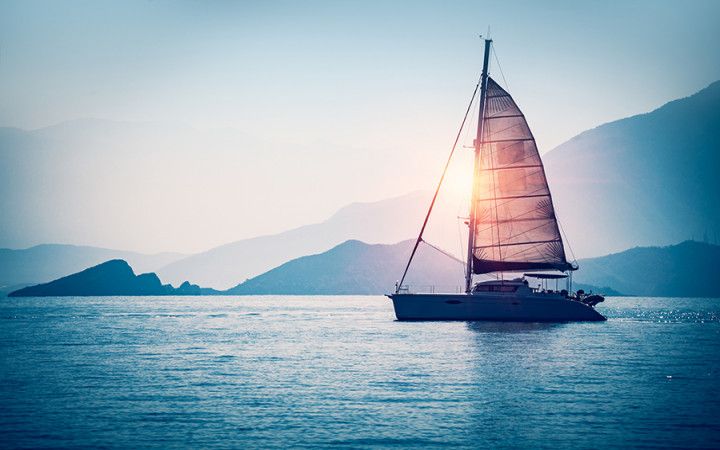I have seldom been interested in the long and some times aimless lectures given by corporate speakers. But this one was different and had me totally hooked . His story was unlike any other . As his lecture got over, the audience of over a 1000 packed in that hall – applauded uproariously. The Speaker was Keerti Chakra awardee Commander Abhilash Tomy . Commander Tomy is an Indian Navy pilot and sailor. He is the first and perhaps the only Indian who has circumnavigated the earth ( ie gone around the circumference of this planet)solo and in a non stop journey . To understand why that’s such an impressive milestone – there are only about 80 such sailors in the world.
During the break post his session, I caught up with him. I asked him how long it took and if it was as exciting as the famous novel by Jules Verne – Around the World in 80 days? He laughed and told me the novel was pure fantasy . I asked him how he survived 23100 miles and close to a year of being absolutely alone . It’s a feat of extreme detachment. The boat was minimalistic to begin with .During his journey he had to throw the carefully preserved water and food when his sails got torn . I couldn’t imagine how he lived alone on sea , living through the tsunami sized waves , his boat developing leaks , him throwing food and water over board . Did he think of his wife and kids ? Ofcourse he did . But he was at peace – with himself and with his surroundings – not racing to get anywhere but moving towards his goal nonetheless. He retired prematurely from the Navy in 2021 to prepare for the Golden Globe Race of 2022 .
His story and coffee table book nudged me to explore a bit more and I looked up the stories of other such daredevil sailors . I discovered that 54 years ago, The Sunday Times announced an award of GBP 5000 to finish the solo circum-navigation of earth . It wasn’t intended to be a race but became one thanks to the award . Curiously, the most publicity went to 2 people who never finished the race . One ended up dead, the other found himself happier than ever. Both outcomes came from decisions made at sea, but neither had anything to do with sailing. The two men, Donald Crowhurst and Bernard Moitessier, are epitomes of how the quality of your life is shaped by who you are trying to impress. Their stories may be about sailing and extreme for sure , but what they dealt with was just a magnified version of what you and me face all the time.
My favorite author Morgan Housel writes about the first one – “Donald Crowhurst was a tinkerer who came up with his own boat modifications. Convinced his innovations could propel him to win the Sunday Times race, he faced just one obstacle: he was broke, and stood no chance of financing the race himself.
Crowhurst struck a deal with an English businessman who agreed to cover the cost of the race under two conditions: They would orchestrate a media frenzy, portraying Crowhurst as a sailing savant. And if Crowhurst didn’t finish, he would owe all the money back.
Crowhurst left on October 31st, 1968, the last day participants of the race could begin their voyage. His boat, the Electron, had been so heavily modified, so weighed down with half-finished gizmos and gimmicks, that it was barely seaworthy for a short sail near home, let alone a solo trip around the globe. Crowhurst knew it. He broke down in tears in front of his wife the night before he left.”
Electron sprung a leak 2 weeks into the journey . Thankfully, Crowhurst was in the South Atlantic sea at that time – which is relatively calm but he had covered only half of the intended distance . He knew he survived no chance in the choppy waters of the Southern Ocean .So, he sailed around in the South Atlantic wondering what to do . Eventually, a crooked scheme took shape. He started sending fake coordinates back to England – indicating that he was actually going around the Cape Horn and circling the globe . The plan he conjured up was that he will while away time in South Atlantic and return back to England in time to take the third or fourth position with nobody being any wiser about him not having gone beyond Europe. He didn’t want to win the race anymore as any inspection of his log books by the judges would uncover the deception. As per his plan, he sailed back to England when he thought realistically he might reach third or fourth . As luck would have it – the boat that was on track to come second – sank . And Crowhurst miscalculated his return time and suddenly was on track to come first and beat the sailor who was in the first place.
The BBC had a crew ready to meet the man defying the odds and covering the earth in the fastest time . Fearing that his game was up and his con would be discovered – leading to humiliation worldwide – Crowhurst threw his radio overboard after sending his last fake coordinates(on June 29th 1969) and was never found. The Electron was found adrift 11 days later – with no damage but also no sign of Crowhurst. Left behind was his diary with his jottings and 2 log books – one real and one fake .
Bernard Moitessier was an expert sailor, and he was on track to legitimately win the race .
Moitessier loved sailing but despised the commercialization of his sport. Or, more accurately, he hated the sport or competition aspect of sailing. He just liked sailing for sailing’s sake. He had the grit and the personality to stay 9 months at sea without any human contact and against all odds but he hated the thought of returning post his journey. He wrote in his diary “I really feel sick at the thought of getting back to Europe, back to the snakepit … I am really fed up with false gods, always lying in wait, spider-like, eating our liver, sucking our marrow. I charge the modern world – that’s the Monster, trampling the soul of men … returning to [England] feels like returning to nowhere.”
He found it meditative being on his boat ,Joshua, and lost track of time while enjoy the blissful oceanic surroundings. Somewhere post crossing The Cape Horn, he made up his mind, to do the unthinkable and abandon the race. Remembering his family and friends he wrote “I do not know how to explain to them my need to be at peace, to continue toward the Pacific. They will not understand. I know I’m right, I feel it deeply. I know exactly where I am going, even if I do not know.” He tossed a jerrycan to a passing ship – to take the message to a French Consul.
He then wrote “Now it is a story between Joshua and me, between me and the sky; a story just for us, a great story that does not concern the others any more … To have the time, to have the choice, not knowing what you are heading for and just going there anyway, without a care, without asking any more questions.”
He docked in Tahiti – stayed on the beach for several years , grew his own food and wrote a book on sailing.
Crowhurst and Moitessier both had incoherent ramblings in their diary at some point indicating a poor mental state but their outcomes seemed to center on the fact that Crowhurst was addicted to what other people thought of his accomplishments, while Moitessier cared two hoots…if anything he was disgusted. One lived for external benchmarks, the other only cared about internal measures of happiness.
Quoting Morgan Housel again “ I know there’s a strong social pull toward external measures – chasing a path someone else set, whether you enjoy it or not. Social media makes it ten times more powerful. But I also know there’s a strong natural desire for internal measures – being independent, following your quirky habits, and doing what you want, when you want, with whom you want. That’s what people actually want.”
So my dear reader- which one are you and which one would you rather be ?
Sources : personal interactions ; Journey to the Edge of the Earth Joenna Fernandes and Cdr Abhilash Tomy ;Morgan Housel ( various blogs)









Comments & Discussion
20 COMMENTS
Please login to read members' comments and participate in the discussion.